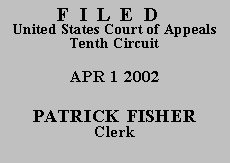

| LORI KREPS SPENCER, individually and as
guardian and conservator of Ryan Lance Kreps;
NOBLE EUGENE KREPS; and ELVA JANET
KREPS, personal representative of the Estate of
Lance Robin Kreps,
Plaintiffs - Appellees,
v.
COUNTY OF CONEJOS Defendants, and CHRIS MONROE, Defendant - Appellant. _________________________ LORI KREPS SPENCER, individually and as guardian and conservator of Ryan Lance Kreps; NOBLE EUGENE KREPS; and ELVA JANET KREPS, personal representative of the Estate of Lance Robin Kreps, Plaintiffs - Appellees, v. COUNTY OF CONEJOS; CONEJOS COUNTY BOARD OF COUNTY COMMISSIONERS; CONEJOS COUNTY SHERIFF'S DEPARTMENT; ISAAC GALLEGOS, Conejos County Sheriff; and CHRIS MONROE, Defendants, and RICARDO MARTINEZ and MICHAEL LEBLANC, Defendants - Appellants.
|
No. 01-1102 (D.C. No. 99-M-337) No. 01-1103 (D.C. No. 99-M-337) (D. Colorado) |
As the Supreme Court has recently reiterated,
Qualified immunity is "an entitlement not to stand trial or face the other burdens of litigation." Mitchell v. Forsyth, 472 U.S. 511, 526 (1985). The privilege is "an immunity from suit rather than a mere defense to liability; and like an absolute immunity, it is effectively lost if a case is erroneously permitted to go to trial." Ibid. As a result, "we repeatedly have stressed the importance of resolving immunity questions at the earliest possible stage in litigation." Hunter v. Bryant, 502 U.S. 224, 227 (1991) (per curiam).
Saucier v. Katz, 121 S. Ct. 2151, 2156 (2001) (emphasis in original). For these reasons, the Court has held that "a district court's denial of a claim of qualified immunity, to the extent that it turns on an issue of law, is an appealable 'final decision' within the meaning of 28 U.S.C. § 1291, notwithstanding the absence of a final judgment." Mitchell, 472 U.S. at 530 (emphasis added). The Court has made it clear, however, that where issues of fact preclude a legal determination that a defendant is entitled to qualified immunity from suit, an order denying qualified immunity is not final and appealable. See Behrens v. Pelletier, 516 U.S. 299, 312-13 (1996); Johnson v. Jones, 515 U.S. 304, 312-14 (1995); see also Foote v. Spiegel, 118 F.3d 1416, 1422 (10th Cir. 1997); Sevier v. City of Lawrence, 60 F.3d 695, 700 (10th Cir. 1995).
In the case before us, plaintiffs filed a civil rights action alleging, among other things, that the fatal shooting of the decedent, arising out of an attempt by sheriff's deputies to arrest him at his father's home for suspected domestic violence, violated the Fourth Amendment. One of the deputies fired the fatal shot, another fired but missed, and a third did not fire at all but was allegedly in charge with respect to the decision to arrest decedent with guns drawn. The three deputies filed motions for summary judgment, claiming they are entitled to qualified immunity. The district court, at a hearing on the motion, denied summary judgment. The court made findings at the hearing but did not set forth its findings in a written order.
Relying on Armijo v. Wagon Mound Pub. Sch., 159 F.3d 1253 (10th Cir. 1998), defendants argue that the district court failed to make sufficient specific findings, thereby giving this court jurisdiction to review the district court's determination that there are fact issues precluding summary judgment on defendants' claim of qualified immunity. Plaintiffs contend the district court's findings, as laid out at the hearing, are sufficiently detailed and support the court's conclusion that fact issues preclude summary judgment. Therefore, plaintiffs assert, we lack jurisdiction over defendants' interlocutory appeal.
As we have noted, this court does not have interlocutory jurisdiction to review the district court's determination that genuine issues of fact preclude summary judgment on a claim of qualified immunity. Id. at 1259. In Behrens and Johnson, the Court recognized the difficulties presented when a district court does not fully identify the particular conduct of defendants that it deemed adequately supported by evidence to defeat a pre-trial determination of qualified immunity. In such a case, an appellate court must undertake a review of the record "to determine what facts the district court, in light most favorable to the nonmoving party, likely assumed." Behrens, 516 U.S. at 313 (quoting Johnson, 515 U.S. at 319). Our independent review of the record makes clear there are multiple questions of fact regarding defendants' conduct in the death of decedent that preclude our review of this matter.
Because there are disputed issues of fact precluding judgment in defendants' favor, we have no jurisdiction over this appeal. Accordingly, we DISMISS for lack of jurisdiction defendants' appeal of the district court's order.
ENTERED FOR THE COURT
Stephanie K. Seymour
Circuit Judge
*.This order and judgment is not binding precedent, except under the doctrines of law of the case, res judicata, and collateral estoppel. The court generally disfavors the citation of orders and judgments; nevertheless, an order and judgment may be cited under the terms and conditions of 10th Cir. R. 36.3.
2.The Honorable David K. Winder, United States District Court for the District of Utah, sitting by designation.